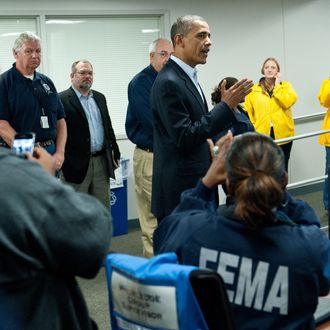
Disasters are inherently political, because government is political, and preventing and responding to disasters is a primary role of the state. But there is an innate tension in overtly politicizing a disaster. At the moment of greatest urgency, emotions run so hot that it’s hard to fairly assess the costs and benefits of disaster response. On the other hand, moments of normality are too cool, and it is far too easy to minimize the costs of preparing for an eventuality that is far from the horizon.
What you are going to see over the next week is an overt effort by Democrats to politicize the issue of disaster response. They’re right to do it. Conservatives are already complaining about this, but the attempt to wall disaster response off from politics in the aftermath of a disaster is an attempt to insulate Republicans from the consequences of their policies.
Funding for FEMA is something the parties wrangle over, with Republicans pushing to limit the agency’s budget, and Democrats pushing back. FEMA has to fight for its share of a constricted pot of money for domestic non-entitlement spending, a pot of money that the Republicans propose to radically constrict. How radically? Romney’s budget promises require shrinking domestic non-entitlement spending as a share of the economy by about two-thirds.
The Republican proposal to eviscerate this wide array of public functions is one of the underdiscussed questions of the election. Republicans have defended it using a very clever trick. They don’t explain how they would allocate the massive cuts to all these programs. When President Obama explains what would happen if those cuts were allocated in an across-the-board fashion, Republicans scream bloody murder. And when any single one of those programs enters the political debate, they can deny plans to make any specific cuts: They won’t cut education, they won’t cut support for veterans, and so on.
Now, it is true that Republicans have no special animus against disaster response. They oppose domestic spending in general, and programs that either impinge upon business or redistribute income from rich to poor in particular. But the most concrete statement of Romney’s view of disaster spending came in a Republican debate last summer. John King, the moderator, asked Romney whether FEMA needed to be devolved to the states. Romney agreed and went farther:
As he has on so many issues, Romney avoided any specific programmatic commitment here. But the clear point he conveyed was that he would not exempt FEMA from his general opposition to federal spending. The question was whether FEMA falls into the category of spending that Romney wants to return to the states, and his response was entirely in the affirmative.
The GOP is the party arguing for splurging on a long vacation at the beach rather than repairing the roof. Naturally, they want to have this argument only when it’s sunny and never when it’s raining. There’s no reason to accommodate them.






























